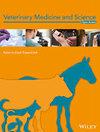Detection and characterization of multidrug resistant Escherichia coli carrying virulence gene isolated from broilers in Bangladesh.
IF 1.8
3区 农林科学
Q2 VETERINARY SCIENCES
引用次数: 0
Abstract
BACKGROUND The emergence and dissemination of multidrug resistant (MDR) bacteria pose a severe threat to public health by limiting clinical treatment and prophylactic options. OBJECTIVES This study investigates the prevalence of Escherichia coli in broilers, their phenotypic antimicrobial resistance (AMR) profiles and the presence of virulence-associated genes (VAGs) and antimicrobial resistance genes (ARGs) using polymerase chain reaction (PCR). MATERIALS AND METHODS A total of 216 pooled cloacal samples were collected from 1080 broilers across six districts of Bangladesh. Each pooled sample comprised randomly selected cloacal swabs from five birds per farm. E. coli isolates were identified using standard bacteriological approach, followed by biochemical assays and PCR. Antimicrobial susceptibility was assessed using the Kirby-Bauer disc diffusion method, and the presence of ARGs and VAGs was determined via PCR. Five selected isolates were partially sequenced for five VAGs using Sanger sequencing. RESULTS A total of 177 E. coli isolates (81.94%, 95% confidence interval: 76.24%-86.53%) were identified. The isolates showed the highest resistance to ampicillin (93.79%), followed by tetracycline (91.53%), erythromycin (89.27%) and ciprofloxacin (87%). Conversely, ceftriaxone (80.79%) showed highest susceptibility, followed by gentamicin (37.29%) and neomycin (31.07%). All isolates were MDR, with a multiple antibiotic resistance indexes were <0.3. A significant percentage (16.38%) of E. coli isolates were MDR to five antimicrobial classes and harboured blaTEM, sul1, ere (A), tetA, tetB and tetC genes. The highest prevalent ARGs were blaTEM (88.14%) followed by ere (A) (83.62%) and sul 1 (72.32%). The prevalence of VAGs was astA (56.50%), iucD (31.07%), iss (21.47%), irp2 (15.82%) and cva/cvi (3.39%), respectively. CONCLUSIONS This study highlights the presence of ARGs contributing to the development of MDR in E. coli carrying VAGs in broilers. Effective monitoring and surveillance of antimicrobial usage in poultry production systems are urgently required to prevent emergence and dissemination of AMR.从孟加拉国肉鸡中分离出的携带毒力基因的耐多药大肠杆菌的检测和特征描述。
背景耐多药(MDR)细菌的出现和传播限制了临床治疗和预防选择,对公共卫生构成严重威胁。本研究使用聚合酶链式反应(PCR)方法调查了肉鸡中大肠埃希氏菌的流行率、表型抗菌药耐药性(AMR)概况以及毒力相关基因(VAG)和抗菌药耐药性基因(ARG)的存在情况。每个集合样本由每个农场随机抽取的 5 只鸡的泄殖腔拭子组成。采用标准细菌学方法对分离出的大肠杆菌进行鉴定,然后进行生化检测和 PCR 检测。抗菌药敏感性采用柯比-鲍尔盘扩散法进行评估,ARGs 和 VAGs 的存在通过 PCR 确定。结果共鉴定出 177 个大肠杆菌分离物(81.94%,95% 置信区间:76.24%-86.53%)。分离物对氨苄西林的耐药性最高(93.79%),其次是四环素(91.53%)、红霉素(89.27%)和环丙沙星(87%)。相反,头孢曲松(80.79%)的敏感性最高,其次是庆大霉素(37.29%)和新霉素(31.07%)。所有分离菌株都具有多重耐药性,多重抗生素耐药性指数均小于 0.3。相当大比例(16.38%)的大肠埃希氏菌分离物对五类抗菌药具有耐药性,并携带 blaTEM、sul1、ere (A)、tetA、tetB 和 tetC 基因。流行率最高的 ARGs 是 blaTEM(88.14%),其次是 ere (A)(83.62%)和 sul 1(72.32%)。VAGs的流行率分别为astA(56.50%)、iucD(31.07%)、iss(21.47%)、irp2(15.82%)和cva/cvi(3.39%)。迫切需要对家禽生产系统中抗菌药物的使用情况进行有效的监测和监控,以防止 AMR 的出现和传播。
本文章由计算机程序翻译,如有差异,请以英文原文为准。
求助全文
约1分钟内获得全文
求助全文
来源期刊

Veterinary Medicine and Science
Veterinary-General Veterinary
CiteScore
3.00
自引率
0.00%
发文量
296
期刊介绍:
Veterinary Medicine and Science is the peer-reviewed journal for rapid dissemination of research in all areas of veterinary medicine and science. The journal aims to serve the research community by providing a vehicle for authors wishing to publish interesting and high quality work in both fundamental and clinical veterinary medicine and science.
Veterinary Medicine and Science publishes original research articles, systematic reviews, meta-analyses, and research methods papers, along with invited editorials and commentaries. Original research papers must report well-conducted research with conclusions supported by the data presented in the paper.
We aim to be a truly global forum for high-quality research in veterinary medicine and science, and believe that the best research should be published and made widely accessible as quickly as possible. Veterinary Medicine and Science publishes papers submitted directly to the journal and those referred from a select group of prestigious journals published by Wiley-Blackwell.
Veterinary Medicine and Science is a Wiley Open Access journal, one of a new series of peer-reviewed titles publishing quality research with speed and efficiency. For further information visit the Wiley Open Access website.
 求助内容:
求助内容: 应助结果提醒方式:
应助结果提醒方式:


